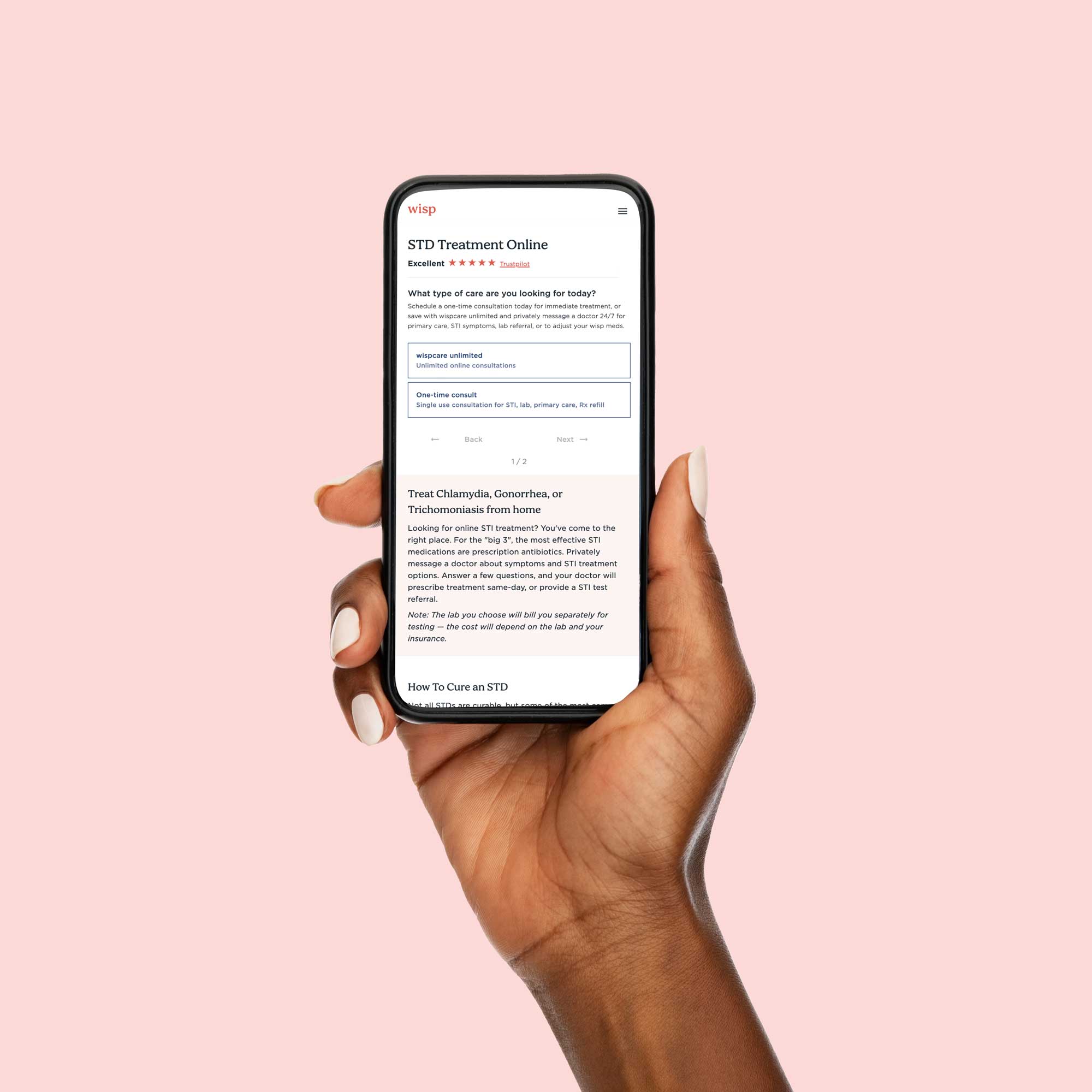
What Are the Most
Common Chlamydia
Symptoms?
Published on Oct 4, 2024
Updated on December 22, 2025
Written by Kathleen Morrison
Medically Reviewed by Andrea Sleeth WHNP-BC, MSCP
Key takeaways
- Chlamydia is often symptom-free, so regular testing is crucial for sexually active people.
- Symptoms vary by gender and can include painful urination, unusual discharge, pelvic pain, or bleeding.
- Untreated chlamydia can lead to serious reproductive complications, including PID, infertility, or ectopic pregnancy.
- The infection is easily treated with prescribed antibiotics, but partners should also be treated to prevent reinfection.
- Safe sex practices—like condoms, regular STI screenings, and timely treatment—are key to avoiding chlamydia.
Imagine that one day you wake up and you're not feeling good, you have pain in your lower abdomen, and it burns like crazy when you pee. Then, you get a text from your sexual partner saying that they've just been diagnosed with chlamydia! Your heart starts racing, and you think—what on earth is chlamydia, how did I get it, and how dangerous is it?
Yikes! This might feel scary, but it's important to know that chlamydia is really easy to treat. Talking with someone about chlamydia can help ease some of the concerns you might have about the infection, and an at-home test makes it simple (and discreet) to take the first step.
How do I get Chlamydia?
Chlamydia is a sexually transmitted infection (STI) caused by bacteria. You get chlamydia when you exchange fluids—specifically semen and vaginal secretions—with someone who has the bacteria in their system. It can also be passed through oral sex, meaning pharyngeal-to-pharyngeal transmission is possible, though less common.
The chlamydia bacteria can be transferred from an infected partner during vaginal, anal, or oral sex. When one infected person's genitals touch someone else's body, even without penetrative intercourse, the bacteria can be transmitted from one partner to the next. We’ll repeat this one because it’s important: chlamydia infection can occur during oral sex if either person has the bacteria!
There are three strains of chlamydia bacteria, and Chlamydia trachomatis is the one that causes the STI. If the bacteria continue to live in your body untreated, you'll start to feel some discomfort and typical chlamydia symptoms. If you continue to have sex before getting treatment, you can spread the infection to others.
Symptoms of Chlamydia
One of the frustrating things about chlamydia is that it is often asymptomatic. 50–70 percent of chlamydia infections in both men and women show no symptoms at all, which is why transmission and reinfection are so common.
That's why it's super important to get tested on a regular basis if you're sexually active. With testing, you'll have peace of mind that if you are carrying the bacteria, you can treat the infection quickly, and not spread it to your sexual partners.
As we mentioned, it’s very possible to have chlamydia without having any symptoms. And when you do have symptoms, they can vary from person to person. The signs of chlamydia for guys are different than those for women, so it’s important to know what to watch out for if you suspect you have chlamydia.
Chlamydia symptoms in women
Sometimes you know when something’s not right after sex. When you have obvious signs of a chlamydia infection, like unusual vaginal discharge or burning, it’s definitely time to get tested and seek out medical help! Once you recognize the symptoms, getting treatment for chlamydia will have you feeling better in no time.
Sexually active women under 25 should get tested at least once a year. If you’re 25 or older, testing is still a good idea if you’re at higher risk—like having multiple partners, a partner with multiple partners, or other risk factors. After treatment, a retest around three months later is smart to make sure everything’s really cleared. Rectal testing can also be an option depending on your sexual activity, which you can figure out with your provider.
Common chlamydia symptoms in women include:
- Painful urination. Painful urination is often associated with UTIs, but it’s also a common symptom of chlamydia.
- Abnormal vaginal discharge. The discharge is often strong-smelling and may have a yellowish color.
- Pain during intercourse. Painful intercourse is a common symptom of chlamydia because the vagina and cervix are swollen.
- Lower belly or back pain. You may experience a dull pain in your lower back, stomach area, or pelvic area along with a fever.
- Bleeding between periods or after intercourse. The inflammation caused by the chlamydia bacteria may cause you to bleed between menstrual cycles or after sexual intercourse.
Chlamydia symptoms in men
It’s very common to have chlamydia without knowing it, as it often comes without any noticeable symptoms. That said, it’s important to know the signs of chlamydia for guys—and to test yourself regularly, of course!
Sexually active men should be tested at least once a year, but it’s a good idea to test every 3 to 6 months if you’re considered to be at increased risk (i.e., men who have sex with men on Pre-Exposure Prophylaxis (PrEP), have an HIV infection, or if you or your sex partners have multiple partners).
Common chlamydia symptoms in men include:
- Painful urination. A burning sensation when you urinate is common in UTIs, but it can also be a sign of chlamydia.
- Penile discharge. Chlamydia can cause penile discharge that has a strong odor and is milky or watery.
- Lower belly pain. You might experience dull pain in your lower abdomen and pelvic area.
- Testicular pain. When left untreated, chlamydia bacteria can cause epididymitis, which is the swelling of the testicular tubes where sperm mature.
Chlamydia symptoms from anal and oral sex
You can also get a chlamydia infection in your anus from receiving anal sex or from the passage of fluids during vaginal sex. Symptoms of chlamydia of the anus include:
- Pain
- Anal discharge
- Anal bleeding
And, you guessed it, you can also get a chlamydia infection in your throat from oral sex. This can cause a cough, sore throat, or dry throat, but it’s possible to carry the bacteria without knowing it.
Chlamydia vs UTI
Chlamydia and urinary tract infections (UTIs) can feel pretty similar, but there are some key differences that can help you figure out what’s going on.
Chlamydia symptoms often include:
- Pain or burning when you pee
- Unusual discharge from the vagina or penis
- Lower abdominal or pelvic pain
- Sometimes no symptoms at all
UTI symptoms usually involve:
- Strong, frequent urge to pee
- Cloudy or strong-smelling urine
- Burning or stinging during urination
- Lower back or pelvic discomfort
Because the symptoms can overlap, the only way to know for sure is with proper testing. You can get tested for chlamydia from the comfort of your home with an at-home STI testing kit, which will also help you rule out a UTI if you test positive.
Once you have results, our licensed providers can guide you on the right next steps, whether that’s treatment or follow-up testing.
If you don’t have chlamydia (yay), you might want to chat to a medical provider about getting a UTI test, and if needed, you’ll easily be able to get an online UTI antibiotics prescription.
Wisp treatment options are available only after consultation with a licensed medical professional. You should consult with your healthcare provider before starting a new supplement or treatment regimen. Individual results may vary.
How is Chlamydia diagnosed?
For ease, privacy, and convenience, having an online consultation with a licensed medical provider will allow you to avoid having to leave your home and go to an in-person medical provider or clinic.
They’ll ask you specific questions, go over your medical and sexual history, and may suggest an at-home testing kit to confirm. Once they diagnose your STI, and if safe and appropriate, they can prescribe the proper medicine to begin treatment immediately.
When should I get tested for chlamydia?
It’s a good idea to get tested if you’ve had new or multiple sexual partners, unprotected sex, or any symptoms like unusual discharge or pain during urination. Testing is also recommended routinely if you’re sexually active.
To make things even easier, you can use an at-home STI testing kit for chlamydia, which allows you to collect a sample in the privacy of your own home and send it to a lab for accurate results.
What are the long-term effects of untreated Chlamydia?
When you test regularly, chlamydia is easy to detect and treat, so normally you won't have any long-term effects. However, if you don't realize you have the infection and don’t get treated, chlamydia can cause some serious long-term effects. For women, chlamydia can lead to several reproductive issues, including:
- Pelvic inflammatory disease
- Ectopic pregnancy
- Infertility
Pelvic inflammatory disease (PID) is an infection of internal reproductive organs often caused by bacteria from untreated STIs, like chlamydia. These bacteria can travel from the vagina to the uterus, fallopian tubes, or into the ovaries and cause scarring. The scarring from PID can lead to infertility and increase your risk of ectopic pregnancies.
Since chlamydia substantially increases the risk of PID, getting yearly GYNO exams along with regular screening for chlamydia is a must! Using condoms and testing for STIs will help keep your reproductive system healthy and free from disease or infections.
What is the treatment for Chlamydia?
The good news is that chlamydia is easily treated with oral antibiotics. Generally, a medical provider will prescribe doxycycline or azithromycin. The dosage of the antibiotic can vary depending on the severity of the infection. Your licensed medical provider will choose an antibiotic and prescribe it either as a single dose or as a course over several days, depending on what’s most appropriate for your infection.
It's important that your sexual partner also gets treated for chlamydia, so you don't reinfect one another.
Be sure to take the full dose of antibiotics for the prescribed amount of time, so the medicine can effectively kill all of the chlamydia bacteria. After treatment, get screened again to make sure there are no bacteria left.
Keep in mind that after taking antibiotics, you may get a yeast infection. If you suspect that you have a yeast infection, you can get prescription antifungal medicine shipped directly and discreetly to your home.
How can I avoid getting Chlamydia?
Because chlamydia is sexually transmitted, it's fairly easy to protect yourself from infection. The best ways to protect yourself include:
- Using condoms: Use high-quality condoms every time you have sex.
- Avoiding sex if you have tested positive for chlamydia: Wait to have sex until you and your partner have completed the treatment.
- Getting regular screenings: Get tested at a clinic or with an at-home test every three months if you have frequent sex, sex with multiple partners, or have had sex with someone you suspect may have the chlamydia infection.
- Taking DoxyPEP for avoiding certain STDs: DoxyPEP works like the morning-after pill, but for STIs! Take DoxyPEP within 72 hours of unprotected sex to lower your risk of chlamydia, gonorrhea, and syphilis.
Remember! These sneaky bacteria don't always come with symptoms, so it can be hard to know whether you have chlamydia or not. This is one of the reasons that chlamydia is such a common STI. After all, if you don't have symptoms, how are you supposed to know you have chlamydia?
Don't guess, just test
Regular screening is your best friend when it comes to chlamydia and other STIs. With an at-home STI test from Wisp, you can check your status quickly, privately, and without leaving your home.
Chlamydia is easy to treat, so knowing is half the battle. Take charge of your sexual health, get tested, and keep enjoying a happy, worry-free sex life.
Grab your at-home STI test from Wisp today and get results with guidance from licensed medical providers—fast, private, and stress-free.
This blog post is for informational and educational purposes only and should not be taken as professional advice. Always consult with a qualified professional before making any decisions based on the information provided here.






